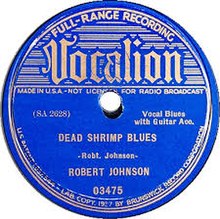
Robert Leroy Johnson was an American blues musician and songwriter. His landmark recordings in 1936 and 1937 display a combination of singing, guitar skills, and songwriting talent that has influenced later generations of musicians. Although his recording career spanned only seven months, he is recognized as a master of the blues, particularly the Delta blues style, and as one of the most influential musicians of the 20th century. The Rock and Roll Hall of Fame describes him as perhaps "the first ever rock star".

Slide guitar is a technique for playing the guitar that is often used in blues music. It involves playing a guitar while holding a hard object against the strings, creating the opportunity for glissando effects and deep vibratos that reflect characteristics of the human singing voice. It typically involves playing the guitar in the traditional position with the use of a slide fitted on one of the guitarist's fingers. The slide may be a metal or glass tube, such as the neck of a bottle, giving rise to the term bottleneck guitar to describe this type of playing. The strings are typically plucked while the slide is moved over the strings to change the pitch. The guitar may be placed on the player's lap and played with a hand-held bar.

Joseph Lee Williams was an American Delta blues guitarist, singer, and songwriter, notable for the distinctive sound of his nine-string guitar. Performing over five decades, he recorded the songs "Baby, Please Don't Go", "Crawlin' King Snake", and "Peach Orchard Mama", among many others, for various record labels. He was inducted into the Blues Hall of Fame on October 4, 1992.

John Ned Shines was an American blues singer and guitarist.

David "Honeyboy" Edwards was an American delta blues guitarist and singer from Mississippi.

"Love in Vain" is a blues song written by American musician Robert Johnson. Johnson's performance – vocal accompanied by his finger-style acoustic guitar playing – has been described as "devastatingly bleak". He recorded the song in 1937 during his last recording session and in 1939 it was issued as the last of his original 78 rpm records.

Tommy Johnson was an American Delta blues musician who recorded in the late 1920s and was known for his eerie falsetto voice and intricate guitar playing.
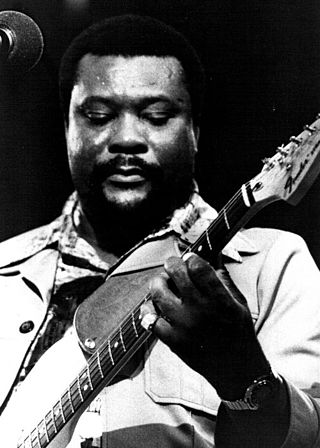
Luther "Guitar Junior" Johnson was an American blues singer and guitarist. He is not to be confused with Luther "Georgia Boy" Johnson, Luther "Houserocker" Johnson, or Lonnie "Guitar Junior" Brooks.
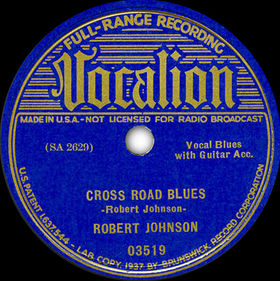
"Cross Road Blues" is a song written by the American blues artist Robert Johnson. He performed it solo with his vocal and acoustic slide guitar in the Delta blues style. The song has become part of the Robert Johnson mythology as referring to the place where he sold his soul to the Devil in exchange for musical genius. This is based largely on folklore of the American South that identifies a crossroads as the site where Faustian bargains can be made, as the lyrics do not contain any references to Satan.

"Sweet Home Chicago" is a blues standard first recorded by Robert Johnson in 1936. Although he is often credited as the songwriter, several songs have been identified as precedents. The song has become a popular anthem for the city of Chicago despite ambiguity in Johnson's original lyrics. Numerous artists have interpreted the song in a variety of styles.

"Dust My Broom" is a blues song originally recorded as "I Believe I'll Dust My Broom" by American blues artist Robert Johnson in 1936. It is a solo performance in the Delta blues-style with Johnson's vocal accompanied by his acoustic guitar. As with many of his songs, it is based on earlier blues songs, the earliest of which has been identified as "I Believe I'll Make a Change", recorded by the Sparks brothers as "Pinetop and Lindberg" in 1932. Johnson's guitar work features an early use of a boogie rhythm pattern, which is seen as a major innovation, as well as a repeating triplets figure.
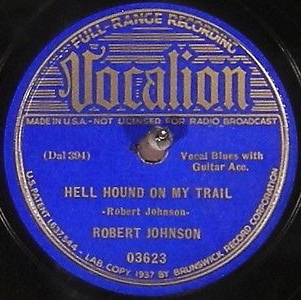
"Hellhound on My Trail" is a blues song recorded by Mississippi Delta bluesman Robert Johnson in June 1937 and released as a 78 rpm single on Vocalion Records that September. It was inspired by earlier blues songs and blues historian Ted Gioia describes it as one of Johnson's "best known and most admired performances—many would say it is his greatest".
James Earl Thompson, known professionally as Jimmy Johnson, was an American blues guitarist and singer.

"It's Nobody's Fault but Mine" or "Nobody's Fault but Mine" is a song first recorded by gospel blues artist Blind Willie Johnson in 1927. It is a solo performance with Johnson singing and playing slide guitar. The song has been interpreted and recorded by numerous musicians in a variety of styles, including Led Zeppelin on their 1976 album Presence.
Blind John Davis was an American blues and boogie-woogie pianist and singer. He is best remembered for his recordings, including "A Little Every Day" and "Everybody's Boogie".

Hot Foot Powder is an album by the British blues band the Peter Green Splinter Group, led by Peter Green. Released in 2000, this was their fifth album. Green was the founder of Fleetwood Mac and a member of that group from 1967 to 1970, before a sporadic solo career during the late 1970s and early 1980s.
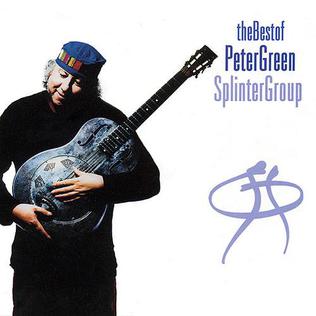
The Best of Peter Green Splinter Group is a compilation album by the British blues band the Peter Green Splinter Group, led by Peter Green. Released in 2002, this was a two-disc set. Green was the founder of Fleetwood Mac and a member of that group from 1967–70, before a sporadic solo career during the late 1970s and early 1980s. This compilation was re-released in 2006.

Dave's Picks Volume 13 is a three-CD live album by the rock band the Grateful Dead. It contains the complete concert recorded on February 24, 1974, at the Winterland Arena in San Francisco, California. It was produced as a limited edition of 16,500 numbered copies, and was released by Rhino Records on February 1, 2015.

American blues musician Robert Johnson (1911–1938) recorded 29 songs during his brief career. A total of 59 performances, including alternate takes, were recorded over a period of five days at two makeshift recording studios in Texas. Producers selected 25, which Vocalion Records issued on 12 two-sided 78 rpm record singles between 1937 and 1939. These went out-of-print, but were the only source of Johnson's work until his recordings were eventually issued on albums beginning in 1959. In addition to those on the original singles, another 17 recordings have been released.
